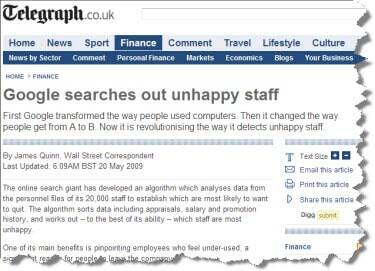Employees who are disillusioned with a company will usually plan their exit pretty soon after their negative thoughts and feelings arise. We’ve all been there haven’t we? We started a new job full of hope and enthusiasm, but after a while the positive feelings decline and we find the company doesn’t live up to our own expectations. Before you know it, you’re looking through the job adverts faster than an MP who is about to be deselected.
Anyone in business knows that staff retention is a real issue; keeping staff is so much more cost effective than replacing them. It costs a lot of money to recruit and train new employees, so it makes sense to do everything you can to keep them.
 Pity Google then. They have lost several high profile staff in recent months and clearly retaining their senior executives has focused their minds. But the company’s response has revealed the way the company itself is run – and that maybe why so many people appear to want to leave.
Pity Google then. They have lost several high profile staff in recent months and clearly retaining their senior executives has focused their minds. But the company’s response has revealed the way the company itself is run – and that maybe why so many people appear to want to leave.
Google’s response to people leaving is to develop a mathematical algorithm to search through data to find out potentially unhappy staff. In other words, as ever, Google thinks the answer to a problem is a technological one. The company, run by engineers, seems to focus on providing a technological response to every issue – rather than wondering if there is an alternative way. Perhaps this may be why they have disillusioned executives – focusing on the technology rather than the people could make them feel unwanted, unloved and unnecessary.
However, Google’s response is only an example of what is happening in many businesses, particularly those who run much of their company via the Internet. Whenever a problem or situation arises, the response frequently appears to be “find a technological answer”. But often, the technological solution may worsen the situation.
Take Pay Per Click advertising as an example. Many businesses seem to believe this will provide them with business leads or actual customers and they spend thousands each month in trying to achieve this. When they don’t succeed as well as they might, they look for ways to improve their advertising and seek technological ways of doing this – keyword research, web analytics and so on. However, sometimes it’s better to take an alternative, non-technological viewpoint. Perhaps the advertising isn’t working because people aren’t looking at it. In other words, the answer may be in the behaviour of people, rather than in the advertising technology itself.
The same is true with employees. Often it’s better to talk to them directly and stay close to them, rather than to sit behind your PC and “connect” with their views via technology. Similarly, for your online business the solutions to any problems will more frequently reside in people than in technology. Don’t make the same mistake as Google.

